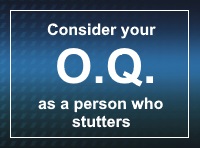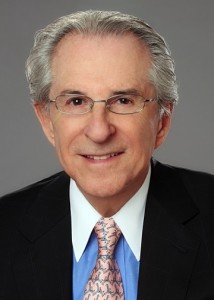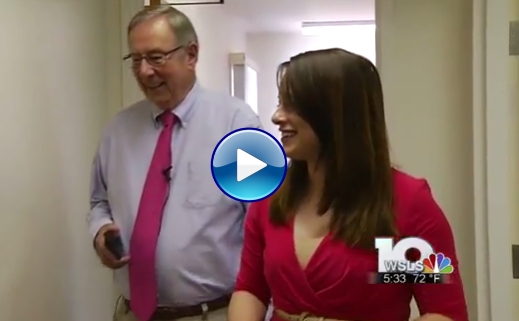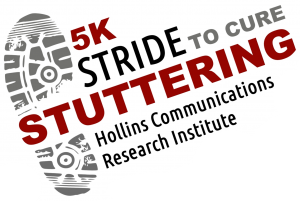Introduction
Individuals who stutter face daily communication challenges and barriers that others who are fluent cannot relate to or even comprehend. For the stutterer, the speech condition is unpredictable and can have detrimental effects on job opportunities, social interactions and educational attainment.

Many who stutter have tried traditional speech therapies with minimal or fleeting fluency outcomes. This propels the ongoing frustration inherent to the condition and the barriers it produces.
In this article, stuttering expert Ronald L. Webster, Ph.D., president of Hollins Communications Research Institute (HCRI), shares a thought-provoking way to view stuttering and its effect on an individual’s life.
In addition, he discusses why people who stutter should consider HCRI’s behavioral-therapy approach that teaches life-long skills to control stuttering and speak fluently.
Considering Your O.Q.
Have you ever thought about your O.Q? Well, you ask, what is an O.Q?
 Your O.Q. is your life Opportunity Quotient. We all have opportunities come along in our lives. Some of us are in a position to be better at generating, recognizing and taking advantage of those opportunities than others.
Your O.Q. is your life Opportunity Quotient. We all have opportunities come along in our lives. Some of us are in a position to be better at generating, recognizing and taking advantage of those opportunities than others.
If you stutter, the odds are that you have a lower O.Q. than you would if you did not stutter. Virtually everyone who stutters at more than a mild level will experience shrinkage in his or her O.Q.
The reason is simple. Many businesses, educational situations and social environments are not accepting of the communication challenges of persons who stutter. The result is an automatic and persistence of O.Q. shrinkage.
Like it or not, if you stutter you have probably experienced O.Q. restrictions as a result of your disfluent speech.
Here at HCRI we specialize in treating individuals who stutter with proprietary procedures we have developed that generate robust, fluent speech in our clients. In fact, our research shows that by end of our intensive 12-day program, 93% of our clients have become fluent speakers. And, at two years post-therapy, 75% retain fluent speech.
These results have been repeated at HCRI time and time again with more than 6,500 individuals. Note that number. It represents real people who made the commitment to attend therapy at HCRI in Roanoke, Virginia. These are individuals who experienced genuine improvements in their speech fluency and in their O.Q.s.
Take for example Scott Nickell, who is now a business development manager for a leading distribution company. His success depends on his ability to effectively communicate with decisionmakers. As a person who stutters, Scott found his speech hindering when he was young. He couldn’t say certain words and struggled to communicate each day. His education and social life were challenging and his self-confidence compromised. Yet, once he attended HCRI stuttering therapy as a young adult, he acquired the ability to use the skills he learned to generate fluent speech. As a result, Scott was able to pursue his career ambitions with joy and confidence.
Another example is producer and filmmaker Elan Dassani. He participated in HCRI stuttering therapy to succeed in an industry where talk is everything. Yet, when he was younger, his speech was characterized by intermittent blocks, repetitions and prolongations of sounds and syllables, which made it difficult to carry on conversations. To fix his stutter, he originally tried different treatments that ranged from wearing an auditory feedback device to meeting with speech therapists. None produced lasting fluency – until he came to HCRI’s 12-day stuttering therapy.
Each individual has his or her own unique challenges with stuttering. Our research and real-world experience has demonstrated that HCRI stuttering therapy is effective across a range of stuttering severities from mild to severe.
If you are looking for help with your stuttering and want to optimize your O.Q. through fluency, consider HCRI stuttering therapy. To learn more, visit www.stuttering.org or contact us at (540) 265-5650 or info@stuttering.org.
View before-and-after stuttering therapy videos >>
Apply today to attend HCRI stuttering therapy >>


.jpg)















